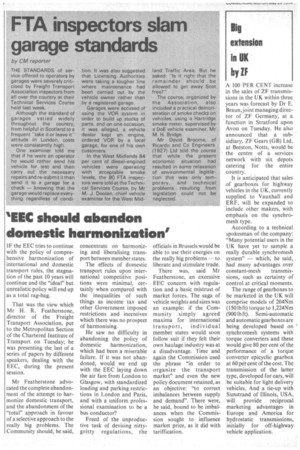'EEC should abandon domestic harmonization'
Page 20

If you've noticed an error in this article please click here to report it so we can fix it.
IF the EEC tries to continue with the policy of comprehensive harmonization of international and domestic transport rules, the stagnation of the past 10 years will continue and the "ideal" but unrealistic policy will end up as a total rag-bag.
That was the view which Mr H. R. Featherstone, director of the Freight Transport Association, put to the Metropolitan Section of the Chartered Institute of Transport on Tuesday; he was presenting the last of a series of papers by different speakers, dealing with the EEC, during the present session.
Mr Featherstone advocated the complete abandonment of the attempt to harmonize domestic transport, and the abandonment of the "total" approach in favour of a selective approach to the really big problems. The Community should, he said, concentrate on harmonizing and liberalising transport between member states.
The effects of domestic transport rules upon international competitive positions were minimal, certainly when compared with the inequalities of such things as income tax and other Government imposed restrictions and incentives which there was no prospect of harmonising.
He saw no difficulty in abandoning the policy of domestic harmonization, which had been a miserable failure. If it was not abandoned, would we end up with the EEC laying down the air fare from London to Glasgow, with standardized loading and parking restrictions in London and Paris, and with a uniform professional examination to be a bus conductor?
Freed of the unproductive task of devising nittygritty regulations, the officials in Brussels would be able to use their energies on the really big problems to liberate and stimulate trade.
There was, said Mr Featherstone, an excessive EEC concern with regulation and a basic mistrust of market forces. The saga of vehicle weights and sizes was an example: if the Community simply agreed maxima for international transport, individual member states would soon follow suit if they felt their own haulage industry was at a disadvantage. Time and again the Commission used the phrase "in order to organize the transport market" and even the new policy document retained, as an objective: "to correct imbalances between supply and demand". There were, he said, bound to be imbalances when the Commission sought to influence market price, as it did with ta rifficat ion.




































































































































